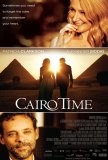Cairo Time (Canada/Ireland/Egypt, 2009)
August 07, 2010
Cairo Time is about yearning and longing. It's about the bond of intimacy that can be generated by a look and expanded upon by a smile. It's about an impossible love that is never spoken of or openly acknowledged. Aside from a fleeting, stolen kiss, there is little physical interaction. This is about two people who respect each other too much to make the other take the risk. The Hollywood ideal is that love conquers all. Cairo Time shows something more real and, if the ending is bittersweet (as we know it must be from the beginning), it is something most viewers will understand.
This is a three-character story. The first two, Juliette and Tareq, are played by actors Patricia Clarkson and Alexander Siddig. The third is the city of Cairo, which is displayed in the most favorable and romantic manner possible by writer/director Rubba Nada and cinematographer Luc Montpellier. Cairo Time is a valentine to Egypt. Shots are composed as if for postcards. Never have the pyramids looked more lovely and never has the Nile been so beguiling. In one scene, a phone conversation occurs in the background while the camera lingers on a cityscape where the only thing that moves is a boat lazily making its way along the river. One could make a case that Cairo Time is as much a travelogue as it is a romance. In fact, one could make the case that Cairo Time is more of a travelogue than a romance.
The story is simple. Juliete is in Cairo for a vacation with her diplomat husband, Mark (Tom McCamus). An entanglement in Gaza delays him and Juliette is left on her own for days. Mark's former aide, Tareq, agrees to act as Juliette's taxi driver, tour guide, and companion for a time and, as the two wander the city and venture into the nearby White Desert, they develop fledgling feelings for one another. In a way, it's a little like Before Sunrise in that the majority of the film involves two characters perambulating around one of the world's great cities, seeing the sights, and talking to one another. It is, however, not quite as magical or openly romantic. And the conversations sometimes turn to weighty matters such as why teenage girls are forced to toil for long hours weaving carpets when educated businessmen can go home in the middle of the afternoon and spend the remainder of their day in leisure activities.
Of course, Juliette and Tareq are individuals, but they represent more than that to each other. For Juliette, a North American who has never before been to the Middle East, Tareq embodies Cairo, and her love for him develops alongside her fascination for a city that she sees as exotic and full of contradictions. For Tareq, whose powerful sense of morality is circumscribed by his culture, Juliette represents the enticing but unattainable. She is the wife of a friend - a fact that, even if the religious and societal gap was not so wide, puts her forever beyond his grasp.
The slow, languorous pace signals that this is a labor of love for the Montreal-born filmmaker: love of a location, love of two characters, and love between those individuals. For her leads, she chose perfectly. Alexander Siddig (for whom the role was allegedly written) is charming and captivating - a performer of exceptional skill whose work in Ridley Scott's Kingdom of Heaven deserved more praise than it was accorded. Patricia Clarkson is sublime as always, and undergoes a remarkable transformation during the course of the movie. In her first shot, she looks worn and weary but, by the end, she has become vibrant, blossoming in the desert heat.
Cairo Time is for those who want to see Egypt through the rose-colored lens of a movie-maker and who are intrigued by are intrigued by the subject of unrequited, impossible love. The film is more passionate in its depictions of the locale than in how it treats the characters, but it is honest and true and, although not as ultimately satisfying as Lost in Translation, it offers some of the same sensations and feelings.
Cairo Time (Canada/Ireland/Egypt, 2009)
Cast: Patricia Clarkson, Alexander Siddig
Screenplay: Rubba Nada
Cinematography: Luc Montpellier
Music: Niall Byrne
U.S. Distributor: IFC Films
U.S. Release Date: 2010-08-06
MPAA Rating: "PG"
Genre: DRAMA/ROMANCE
Subtitles: In English and Arabic with English subtitles
Theatrical Aspect Ratio: 2.35:1

Comments